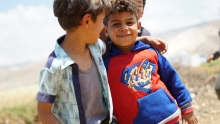World Refugee Day: Rich countries must take their share of responsibility

This is the reality in Lebanon. Since the Syrian war broke up back in 2011, the country has welcomed over 2 million refugees and its population has risen from 6 million to over 8 million.
It is also the reality of many developing countries that are currently hosting 84% of the world’s refugees, while rich nations have accepted few: UK, 10,000; France, 12,000; Switzerland, 13,000; Canada, 60,000; Germany, 600,000.
As Rosa Pavanelli, General Secretary of Public Services International, points out on this World Refugee Day:
“Developing countries hosting the refugees cannot do this alone. They need the support of the international community. However, rich countries must also assume their responsibility of receiving the refugees, instead of closing their borders, or worse, externalising their borders to keep the refugees out.”
To add to this already dramatic situation, over half of the refugees and displaced persons worldwide are female and children; and “refugee services” are being used by enterprises and NGOs as just another market from which to make profit through privatization and outsourcing.
“We need to move away from the segregation, parallel services and encampment which refugees face and encourage public investment. And for that, funding public services is key. Allowing access to public services for refugees, while also ensuring that host communities benefit from strengthened and well-resourced services, is vital to foster integration and inclusion,” continues Pavanelli.
UN Global Compact on Refugees
In order to address and alleviate this situation, member States of the United Nations are to adopt this year a UN Global Compact on Refugees – which contains the Comprehensive Refugee Response Framework (CRRF) under the 2016 New York Declaration for Refugees and Migrants, and a Programme of Action.
The Compact will set the blueprint for a global response to protect and assist refugees and support host countries and communities.
“The UN Global Compact on Refugees is an opportunity to set things right. With forced human displacement continuously on the rise due to conflicts, exacerbated by climate-related forced displacement, the Global Compact will be a test of our humanity and solidarity in responding to the plight of refugees worldwide,” concludes Pavanelli.

